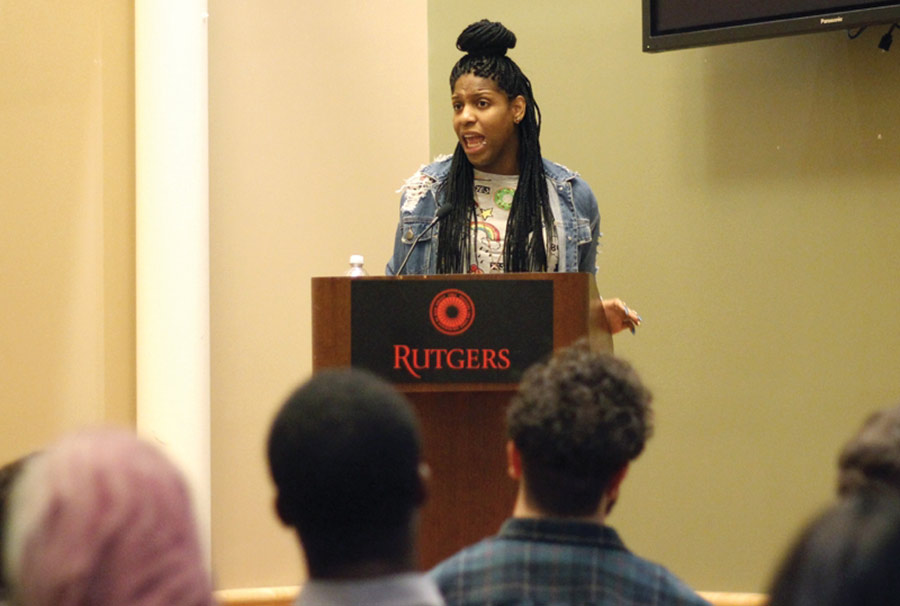“Unapologetic” is the word that activist CeCe McDonald used over and over again in her speech at Rutgers University-Camden for the International Transgender Day of Visibility. McDonald arrived to the event, unapologetically wearing a black cap, a leather jacket and a high pair of black heels, and spoke about her upbringing in Chicago, her history with activism and the violent experience that she faced as a black trans woman.
“I thought I was going to die,” she admitted, scanning the crowd.
On June 5, 2011, McDonald and her friends were walking to the grocery store at night. When they passed a bar where a group of white people were smoking cigarettes, they were threatened and insulted about their race and orientation. A fight broke out when McDonald and her friends tried to walk away, and the fight ended when McDonald, in defense, stabbed one of the perpetrators, who later died from the wound. McDonald recounts that she thought that the police were “there to help her” but instead she was put into the back of the police car, while bleeding, interrogated and eventually charged with murder. McDonald spent 27 months in a men’s prison and was released in January 2014.
Since her release, McDonald has spoken at various colleges, was interviewed by Rolling Stone and is now working with Laverne Cox, the transgender actor who plays Sophia Burset on “Orange is the New Black,” to create a documentary about her life entitled “Free CeCe.” This documentary will focus on McDonald’s experiences and will also create a much-needed conversation about “the issue of trans misogyny and the epidemic of violence surrounding trans women of color.”
During the speech at Rutgers, McDonald made it clear that these three words (“trans,” “woman” and “colored”) are not exclusive. These characteristics work together to create an experience that causes abuse and violence, and even self-loathing. McDonald said that throughout her life, she “had to overcome violence, depression and suicide” and this is what LGBTQ teens have to face every day. The message that Rutgers University-Camden is trying to get across is that this is not OK and that this is something that is unacceptable in our classes, in our residence halls and in our community.
Prior to McDonald speaking, an “It Gets Better” production video was shown, which was created by Rutgers-Camden students in Ellen Malenas Ledoux’s “Gender and Sexuality in Literature” class and Dawn Walsh’s “New Queer Cinema” classes. Video consultants were Sarah Punderson and Dave Tavani. The video is entitled “It Gets Better When …” and is an 8-minute clip that shows vignettes about how life gets better when we learn to accept each other for who and what we are. Scenes depicted everything from a doctor who does not take into consideration that his patient may not be heterosexual to a situation in which a trans woman wonders which bathroom she should use. Despite these shaky feelings and public discomfort, the message is that it gets better when we all come together and address these issues.
The message behind the event was that it is important to be your own activist. Standing up for LGBTQ rights is quite easy to go unnoticed; instead, you need to make a difference and make your voice heard when you fight for your rights. McDonald is a walking inspiration and provides us with hope and motivation. During her struggles, McDonald told us that she often felt like dying, but the fact that she retained her dignity gives us an important message. Restating the video, it gets better when we don’t assume the sexual orientation of others, it gets better when we speak up as allies, it gets better when we listen and support each other and, most importantly, it gets better when you can love yourself even if you live in a world where no one else does. It is important to be accepting to all and to deny no one.
After all, your smile and open heart can and will save a life.

